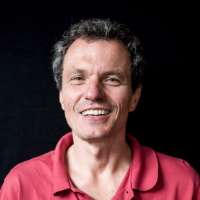Turning George Orwell’s satire Animal Farm into an opera has been on Italian director Damiano Michieletto’s personal bucket list for a long time. The fable remains topical to this day, Orwell showing how a struggle for liberation that is justified in the beginning can degenerate into a new dictatorship that is at least as cruel as its predecessor. With the help of Dutch National Opera, Michieletto has found the ideal composer for his dream project in the shape of Alexander Raskatov.
In 2010, with his successful first opera A Dog’s Heart, Raskatov had already transformed a literary masterpiece into unforgettable musical theatre. Born in Moscow just a few days after Stalin’s death, Raskatov had never read Orwell’s book because it was banned in the USSR, but his own family’s history of suffering under Stalinism meant that he was caught by this project hook, line and sinker. In the libretto of Animal Farm, on which he collaborated with Ian Burton, he incorporates his own allusions to Russia’s turbulent political history to the piece.
The mechanisms of power and oppression that characterised Stalin’s Russia are still at work today throughout the world: Michieletto pulls no punches in setting the allegorical story of those mechanisms in a slaughterhouse. After the general neglect of the farm by Farmer Jones and his wife (played and sung hilariously by Marcel Beekman and Francis van Broekhuizen), a revolt of the animals led by the old pig Old Major (Lenin, brilliantly sung in the deepest register by Gennady Bezzubenkov). They rename the farm “Animal Farm”, in which the law is defined by seven commandments, which are supposed to guarantee that from now on, all animals will live together in harmony and turn away from all things human. Soon, however, the division of labour reveals that the pigs are grabbing the leading roles and placing themselves above that law.
At the time Orwell wrote his parable, it was a topical story of the Russian Revolution turning into Stalin’s dictatorship. With Napoleon (baritone Nisha Kiria, whose imposing voice and fearsone figure makes him ideal for the grimly comic role of the imperious pig) and Snowball (Michael Gniffke sympathetic and death-defying in an agile tenor voice), Orwell and Raskatov have brought Stalin and Trotsky onto the stage in a way that’s clearly recognisable. But Stalin’s cruel henchman Beria also has a key scene, turned into the slimy, ingratiating and mercilessly murderous Squealer.
At the end, “All animals are equal, but some are more equal than others” is written in large neon letters in Paolo Fantin’s stage sky, which continually changes throughout the story. Boxer the workhorse, sung with power and enthusiasm by Germán Olvera, has collapsed from emaciation and, contrary to all the promises made, is taken not to the doctor but the slaughterhouse, in line with the immoral slogan “No person – no problem”.
The Netherlands Chamber Orchestra, reinforced by six percussionists, two harps, saxophones, electric guitars and even a cymbal, is led by the young Lebanese-Polish conductor Bassem Akiki, who keeps the 20-strong ensemble of singers disciplined while giving them plenty of artistic slack at the reins. Dressed in Klaus Bruns’ wonderfully imaginative costumes, the Dutch National Opera Chrous and the many young heads of the New Amsterdam Youth Choir play an important part in the success of an exceptionally contemporary opera that gets right under one’s skin.
In the last scene, when a giant pig is thrown to the slaughter by men in bloody smocks, the opera once again makes terrifyingly clear the many-faceted threats of the age we live in. After Amsterdam, Raskatov’s new opera, dedicated to Dmitri Shostakovich’s wife Irina, will move on to Vienna, Palermo and Helsinki. Hopefully, it will enthuse audiences everywhere as much as it has done at this premiere.
Translated from German by David Karlin




